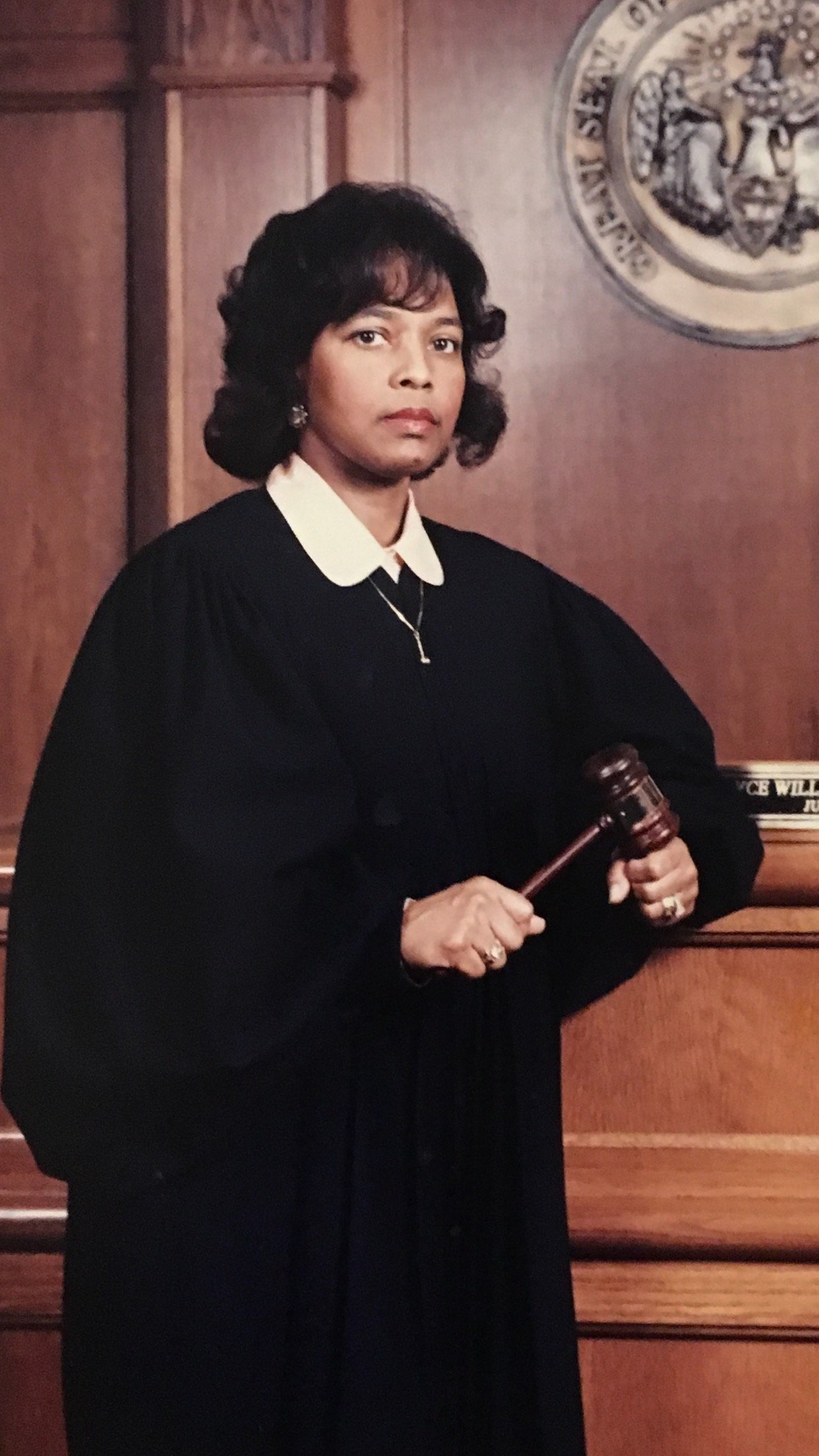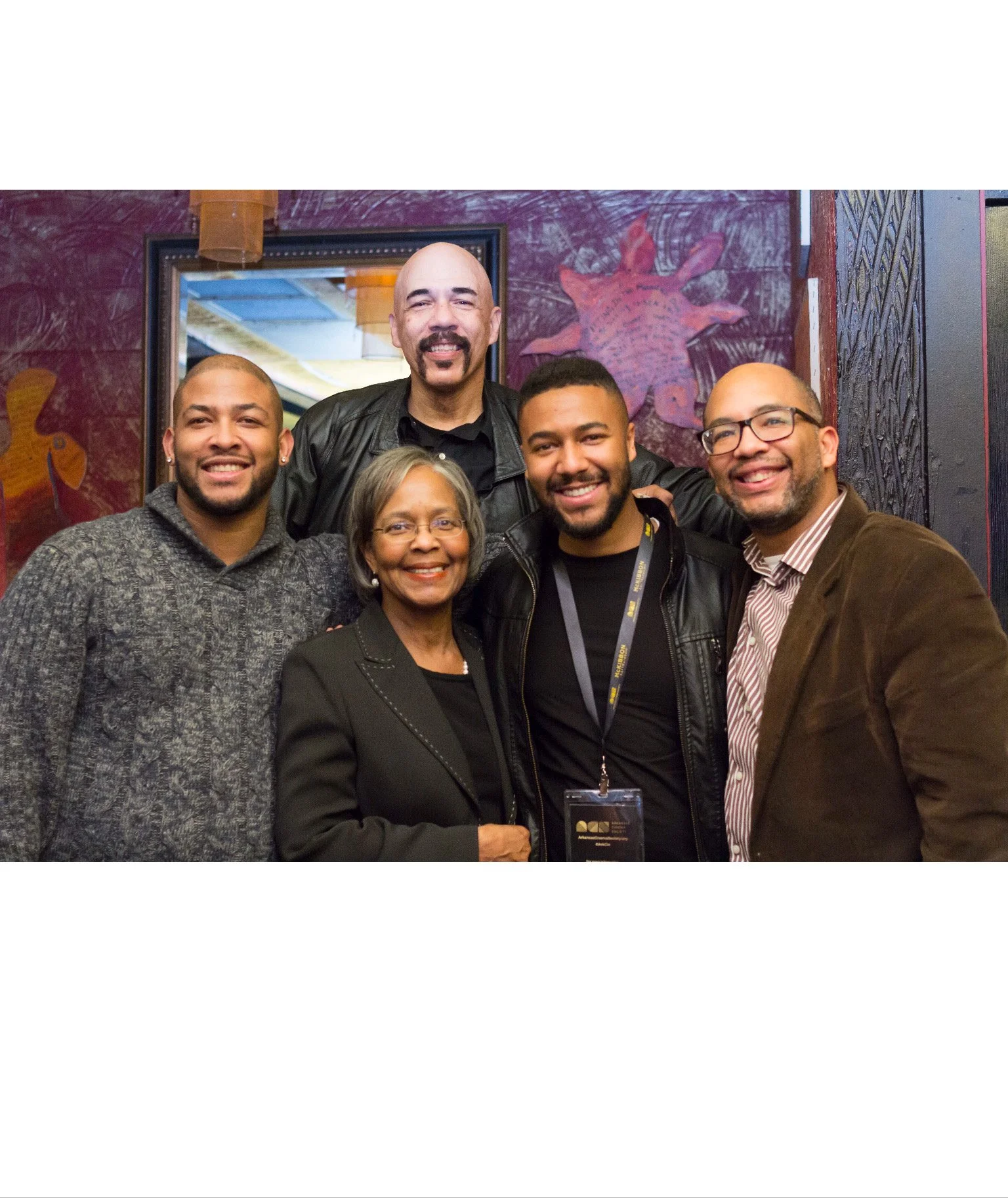The Honorable Joyce Williams Warren
2023 Inductee
Joyce Elise Williams Warren is Arkansas’ first Black female judge, the first Black person ever elected to an Arkansas state-level trial court judgeship, the first Black female graduate of the UALR William H. Bowen School of Law, the first Black law clerk for the Arkansas Supreme Court, the first Black female appointee and first Black Chairperson to serve on the Arkansas State Board of Law Examiners, the first Black female appointee and first Black female to serve as Chairperson on the Arkansas Judicial Discipline and Disability Commission, the first Black person to be elected to the Arkansas Judicial Council Board of Directors, the first Black President of the Arkansas Judicial Council, and the first Black person to receive the “Outstanding Jurist Award” from the Arkansas Bar Association and the Arkansas Bar Foundation. She was only 11 years old when she and nine other Black students were the first to integrate West Side Junior High School in Little Rock. Although she has blazed many trails, most of those accomplishments were made without her knowledge that she would be a “first.”
Warren is most often credited with her dedicated and tireless work as a juvenile judge who formed, joined, and led collaborative efforts—both on and off the bench—to improve the lives of Arkansas’ children and families. Her contributions helped create a new Arkansas juvenile justice system, adopt improvements to adoption laws, create standards for attorneys who represent children and parents in child abuse and neglect cases, establish accountability for those who provide or should provide services to children in need, and protect those children in correctional facilities and/or medical facilities.
She was born in Pine Bluff, Arkansas on October 25, 1949 and grew up in Little Rock. Her parents, both of whom were teachers, divorced when she and her sister, Janice, were very young. She developed her interest in helping children and families because she was surrounded by her mother, maternal grandmother, and two maternal aunts—all of whom were public school teachers. She witnessed these closely-knit family members devoting their time and resources to help provide for the needs of children 1 and families in their classrooms and in the community. She attended public schools in Little Rock, breaking the color barrier when she was one of ten Black students who integrated West Side Junior High School—just four years after the Little Rock Nine integrated Central High School. She graduated from Central High School in 1967, and attended both Rockford College (now Rockford University) in Rockford, Illinois and the University of Arkansas at Little Rock, where she earned a Bachelor of Arts in Sociology and Anthropology. She began attending law school part-time at night. She married James in 1972, and they had two sons, Jonathan and Jamie, while she was still in law school. She earned her law degree from the University of Arkansas at Little Rock School of Law (now UALR William H. Bowen School of Law) in 1976—becoming the law school’s first Black female graduate. Warren continued her legal and judicial education after she became a judge, and earned a Diploma of Judicial Skills from the American Academy of Judicial Education in 2001.
Warren’s first job after law school started in January 1977, when she became a law clerk for Arkansas Supreme Court Associate Justice Darrell Hickman—thus earning her the distinction of becoming the first Black person to serve as a law clerk for the State’s highest court. Her next job was as an assistant attorney general for Bill Clinton. In January 1979, when Clinton took office in his first term as Governor, she worked as one of his administrative assistants until November 1979. She was an in-house legal advisor for the Arkansas Department of Health from November 1979 until February 1981. She had a brief family law practice, and then worked as a staff attorney for Central Arkansas Legal Services from January to December 1982. In January 1983, Pulaski County Judge Don Venhaus appointed her as Pulaski County Juvenile Court Judge—making her the first Black female judge in Arkansas. She served in that capacity until January 20, 1987, when the Arkansas Supreme Court declared the county juvenile court system unconstitutional. Shortly after that court decision, Governor Clinton appointed her to serve on the newly created Arkansas Juvenile Justice Commission, which was tasked with making recommendations for the creation of a new juvenile court system. During the period of the Commission’s existence, she and James had their last child, Justin. Also, in that same time frame, she served briefly as a special 2 master hearing juvenile cases for the Sixth Judicial District Circuit and Probate (Chancery) Judges, and was later appointed by Venhaus to serve as Pulaski County Paternity Judge, holding that office from July 1987 until April 26, 1989.
In March 1989, the Arkansas Legislature created 17 new circuit-chancery judgeships to hear juvenile matters—with only one of those designated for the Sixth Judicial District (Pulaski and Perry Counties). Governor Clinton appointed Warren to that sole position, which she held from August 1, 1989 until her term ended on December 31, 1990. In November 1989, the Legislature created a second juvenile judgeship in the Sixth Judicial District. Warren was elected, without opposition, to that judgeship in November 1990—again making history by becoming the first Black person ever elected to a state-level trial court judgeship in Arkansas. After that election, she was elected five more times—with no opponents—and continued hearing juvenile cases on the juvenile division bench until she retired on December 31, 2020, after serving the public for over 31 years on the state bench, and 6 years on the county bench.
Over her lengthy career as a public servant, Warren presided over a caseload which mostly involved juvenile cases. She heard thousands of cases and saw children and families with a myriad of problems, such as poverty, neglect, educational deficits, sexual abuse, physical abuse, trauma, mental illness, and drug abuse. Juvenile court is a problem-solving court, which can be rewarding—but more often emotionally and physically draining; however, as difficult as most days were, Warren loved her work. Her passion for justice and fairness fueled her efforts to help improve the systems that touched children and families to help solve or prevent their problems. She set a high standard of excellence for herself and others. She credits God for giving her the strength and courage to forge ahead, and James for guiding her career and being her biggest “cheerleader.”
She has served in multiple positions to gain knowledge, advocate for reform, and challenge laws to improve systems that serve children and families in need. She was Chairperson of the Arkansas Governor’s Children’s Council, which was established after 3 a lawsuit was filed over the condition of the State’s child welfare system, and charged to oversee reforms being made in the child welfare system. She served for many years as Chairperson of the Supreme Court Ad Hoc Committee on Foster Care and Adoption. She was a member of the Governor’s Working Group on Juvenile Justice, which was created in response to the tragic school shooting in Jonesboro, Arkansas. She helped establish 10th Division Circuit Court as a Pilot Court for a Dependency-Neglect Mediation Project in Arkansas. She was Chairperson of the Arkansas Children’s Behavioral Health Care Commission.
She helped implement and presided over the Arkansas Pilot Court Team for Safe Babies, which is based on the science of babies’ brain development. Safe Babies Court Team (SBCT) is a systems-change initiative focused on improving how courts, child welfare agencies, and related child-serving organizations work together, share information, and expedite services for young children.
10th Division Circuit Court was selected as one of eight (8) courts across the Nation to be a part of a new Implementation Sites Project, which involved the National Council of Juvenile and Family Court Judges (NCJFCJ) providing training to courts seeking to implement principles and practices to improve outcomes for abused and neglected children and their families.
In October 2000, Warren wrote A Booklet for Parents, Guardians, and Custodians in Abuse and Neglect Cases, which has been printed and updated in English and Spanish and distributed throughout Arkansas and other states.
She is humbled by and grateful for the numerous honors, awards, and recognitions she has received. In 1995, 1996, 1997, and 1998, Arkansas Business selected her as one of the “Top 100 Women in Arkansas.” She was named National CASA Judge of the Year in 2012. In that same year, the Arkansas Democrat Gazette online edition named her as one of the “10 Most Influential Blacks in Arkansas.” In 2018, the Pulaski County Bar Association chose her as one of its “Arkansas Legal Pioneers and Living Legends.” 4 Arkansas Advocates for Children and Families chose her as one of the “2020 Friends of Children Honorees.” The Arkansas Bar Association and the Arkansas Bar Foundation chose her to receive the 2021 ‘“Outstanding Jurist Award.” In that same year, she received the University of Arkansas at Little Rock William H. Bowen “Distinguished Alumni Award.” Since 2012, she has been listed in the Central Arkansas Library System Encyclopedia of Arkansas.
Even in her retirement, she continues to work to improve the lives of children and families. As a Judicial Consultant for ZERO TO THREE, she serves as an advisor to the Infant Toddler Court Program (ITCP), assists in supporting the implementation of the Safe Babies Court Team (SBCT) approach in new states and sites, and provides training as needed. She is a member of the Arkansas Safe Babies Court Team (SBCT) State Advisory Committee, and serves on the boards of the Arkansas Judges and Lawyers Assistance Program (JLAP) Foundation, the Arkansas Commission for Parent Counsel, and the Interfaith Center of Arkansas. She is a member of St. Margaret’s Episcopal Church, where she serves on the Vestry.
As she always did, Warren still makes her own family her top priority. She and James (now married over 51 years) are proud of their three sons, Jonathan, Jamie, and Justin, their respective wives, Courtney, Kassie, and Heather---and even prouder of their 11 grandchildren.




